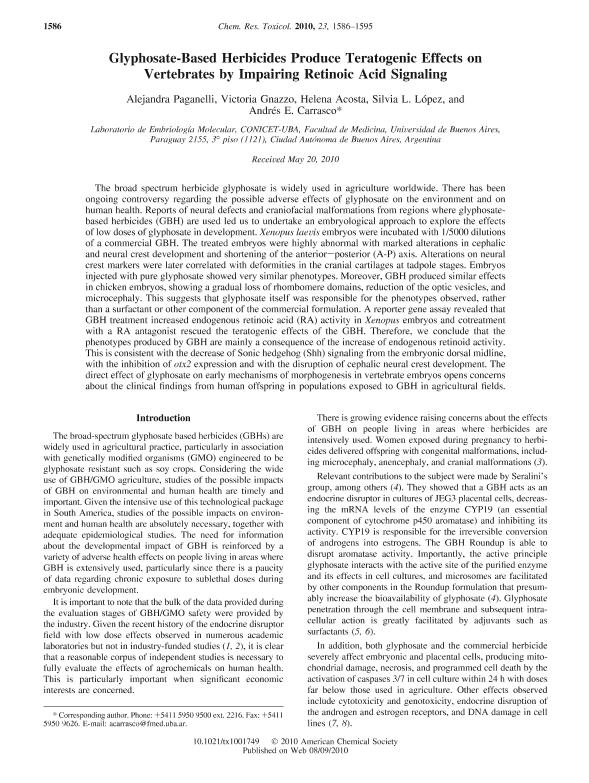Artículo
Glyphosate-based herbicides produce teratogenic effects on vertebrates by impairing retinoic acid signaling
Paganelli, Alejandra Raquel ; Gnazzo, Victoria
; Gnazzo, Victoria ; Acosta, Helena; Lopez, Silvia Liliana
; Acosta, Helena; Lopez, Silvia Liliana ; Carrasco, Andres Eduardo
; Carrasco, Andres Eduardo
 ; Gnazzo, Victoria
; Gnazzo, Victoria ; Acosta, Helena; Lopez, Silvia Liliana
; Acosta, Helena; Lopez, Silvia Liliana ; Carrasco, Andres Eduardo
; Carrasco, Andres Eduardo
Fecha de publicación:
10/2010
Editorial:
American Chemical Society
Revista:
Chemical Research In Toxicology (Washington)
ISSN:
0893-228X
Idioma:
Inglés
Tipo de recurso:
Artículo publicado
Clasificación temática:
Resumen
The broad spectrum herbicide glyphosate is widely used in agriculture worldwide. There has been ongoing controversy regarding the possible adverse effects of glyphosate on the environment and on human health. Reports of neural defects and craniofacial malformations from regions where glyphosate-based herbicides (GBH) are used led us to undertake an embryological approach to explore the effects of low doses of glyphosate in development. Xenopus laevis embryos were incubated with 1/5000 dilutions of a commercial GBH. The treated embryos were highly abnormal with marked alterations in cephalic and neural crest development and shortening of the anterior posterior (A-P) axis. Alterations on neural crest markers were later correlated with deformities in the cranial cartilages at tadpole stages. Embryos injected with pure glyphosate showed very similar phenotypes. Moreover, GBH produced similar effects in chicken embryos, showing a gradual loss of rhombomere domains, reduction of the optic vesicles, and microcephaly. This suggests that glyphosate itself was responsible for the phenotypes observed, rather than a surfactant or other component of the commercial formulation. A reporter gene assay revealed that GBH treatment increased endogenous retinoic acid (RA) activity in Xenopus embryos and cotreatment with a RA antagonist rescued the teratogenic effects of the GBH. Therefore, we conclude that the phenotypes produced by GBH are mainly a consequence of the increase of endogenous retinoid activity. This is consistent with the decrease of Sonic hedgehog (Shh) signaling from the embryonic dorsal midline, with the inhibition of otx2 expression and with the disruption of cephalic neural crest development. The direct effect of glyphosate on early mechanisms of morphogenesis in vertebrate embryos opens concerns about the clinical findings from human offspring in populations exposed to GBH in agricultural fields.
Palabras clave:
Xenopus
,
Ra
,
Shh
,
Neural Crest
Archivos asociados
Licencia
Identificadores
Colecciones
Articulos(IBCN)
Articulos de INST.DE BIOLO.CEL.Y NEURCS."PROF.E.DE ROBERTIS"
Articulos de INST.DE BIOLO.CEL.Y NEURCS."PROF.E.DE ROBERTIS"
Citación
Paganelli, Alejandra Raquel; Gnazzo, Victoria; Acosta, Helena; Lopez, Silvia Liliana; Carrasco, Andres Eduardo; Glyphosate-based herbicides produce teratogenic effects on vertebrates by impairing retinoic acid signaling; American Chemical Society; Chemical Research In Toxicology (Washington); 23; 10; 10-2010; 1586-1595
Compartir
Altmétricas



